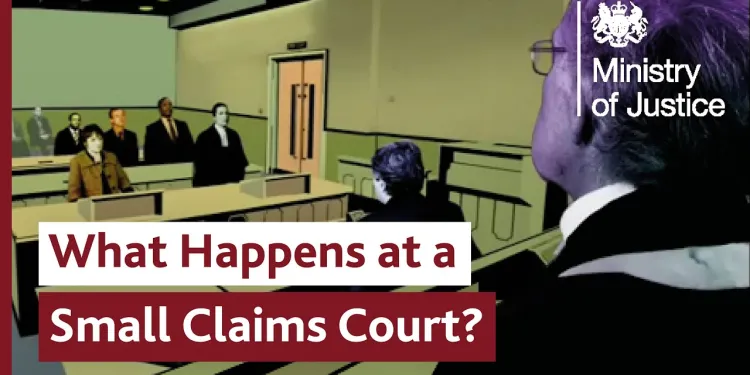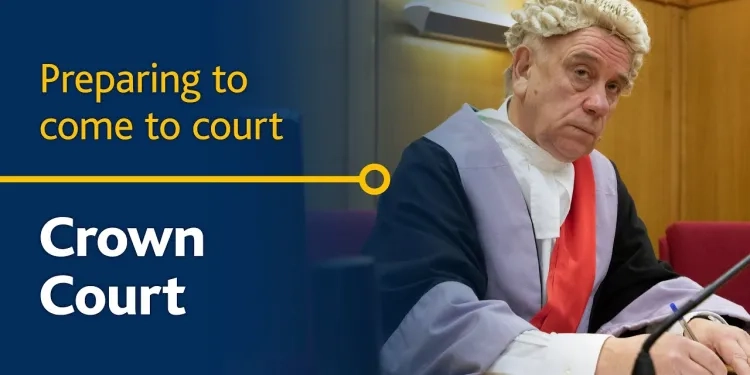Find Help
More Items From Ergsy search
-

How to represent yourself in family court in England and Wales
Relevance: 100%
-

Divorce UK (England and Wales) | UK Divorce Process and Overview Explained PART 1 | BlackBeltBarrister
Relevance: 46%
-

The Family Court without a Lawyer
Relevance: 44%
-

The Family Court without a Lawyer - Video 3 of 3
Relevance: 44%
-

The Family Court without a Lawyer - Video 2 of 3
Relevance: 43%
-

The Family Court without a Lawyer - Video 1 of 3
Relevance: 42%
-

Magistrates in the Family Court: A Public Law Case
Relevance: 34%
-

Magistrates in the Family Court: A Private Law Case
Relevance: 34%
-

What are the changes to Family Court Law in 2026?
Relevance: 32%
-

What Happens at Small Claims Court? Making a Court Claim for Money
Relevance: 32%
-

What about Stamp Duty in Wales?
Relevance: 31%
-

Can I represent myself in tribunal proceedings?
Relevance: 31%
-

The Crown Court
Relevance: 31%
-

Are there modifications to legal aid access in family court for 2026?
Relevance: 30%
-

Credit Union tour of Wales
Relevance: 30%
-

What digital services have been introduced in family courts in 2026?
Relevance: 29%
-

How To Prove Narcissistic Abuse In Family Court UK
Relevance: 29%
-

What are the new protocols for domestic violence cases in family court in 2026?
Relevance: 28%
-

A History of The Church of England
Relevance: 28%
-

Crown Court - Preparing to come to court
Relevance: 28%
-

History of the Church of England
Relevance: 27%
-

Can the Attorney General override a court decision?
Relevance: 27%
-

Child Care Proceedings | Family Law
Relevance: 26%
-

Are there any changes to surrogacy arrangements under the 2026 family court law?
Relevance: 26%
-

How are parental rights addressed differently in the 2026 family court updates?
Relevance: 26%
-

Have the rules for changing a child's name in family court changed in 2026?
Relevance: 25%
-

Have the rights of same-sex couples been affected by the 2026 family court changes?
Relevance: 25%
-

How Was the Church of England Established
Relevance: 25%
-

Social Services and Well-being (Wales) Act: Assessments
Relevance: 25%
-

What is the status of joint custody provisions in the 2026 family court updates?
Relevance: 24%
-

How have prenup agreements been affected by the 2026 family court changes?
Relevance: 24%
-

Court of Protection
Relevance: 24%
-

How do court holidays affect the timeline for a case to come to court?
Relevance: 23%
-

What are the key changes to family court law in 2026?
Relevance: 22%
-

How long does it take for a case to come to court?
Relevance: 21%
-

What steps can a party take to expedite a court date?
Relevance: 21%
-

What role do customer service representatives play in fee transparency?
Relevance: 20%
-

How does the type of case impact the court schedule?
Relevance: 20%
-

Do I need a solicitor to bring a case to the tribunal?
Relevance: 20%
-

Is there a standard minimum or maximum time for a case to reach court?
Relevance: 20%
How to Represent Yourself in Family Court in England and Wales
Understanding the Legal Framework
Representing yourself in family court, known as being a 'litigant in person', can be challenging. Understanding the legal framework is crucial. Family courts in England and Wales handle matters such as divorce, child custody, and financial disputes. Familiarise yourself with the relevant laws, regulations, and procedures, including the Family Procedure Rules. Access to legal guides and advice from organisations such as Citizens Advice or LawWorks can be beneficial.
Preparing Your Case
Thorough preparation is essential for representing yourself successfully. Gather and organise all relevant documents, such as financial records, communication logs, and any evidence supporting your case. Write a clear statement outlining your position and desired outcomes. Understanding the facts and being able to present them logically will create a strong foundation for your case.
Filing and Serving Documents
Ensure you correctly complete and file all necessary court forms. Forms are available from the HM Courts & Tribunals Service website. It’s also important to serve documents to other parties involved, following the court's rules for delivery. Failure to properly file or serve documents can delay your case or lead to dismissal.
Attending Court Hearings
When attending court, punctuality and appropriate dress are vital. Speak clearly and respectfully to the judge and other parties. Bring all necessary documents and be prepared to present your arguments succinctly. Understanding courtroom etiquette and process will help you navigate hearings more effectively.
Seeking Support and Advice
Although you are representing yourself, seeking advice from legal professionals can be invaluable. Many organisations offer free or low-cost legal advice, and attending workshops or support groups for litigants in person can provide additional insights. Balancing self-representation with expert guidance can significantly enhance your approach and confidence in family court.
How to Represent Yourself in Family Court in England and Wales
Understanding the Legal Framework
Sometimes you have to speak for yourself in family court. This means you are a 'litigant in person'. It's important to know the rules and laws. Family courts look at things like divorce and who looks after kids. Learn about the Family Procedure Rules. Places like Citizens Advice can help you understand more.
Preparing Your Case
Getting ready is very important. Collect all papers you need, like bank records and messages. Write down what you want to say and what you hope will happen. Knowing your facts well will help you a lot.
Filing and Serving Documents
Fill out and send the right court papers. You can find these forms online on the HM Courts & Tribunals Service website. You must also send copies to the other people involved. If you don't do this right, your case can be delayed or stopped.
Attending Court Hearings
When you go to court, be on time and dress nicely. Talk clearly and be polite to everyone, especially the judge. Bring all your papers and be ready to talk about your case quickly and clearly. Knowing how a courtroom works will help you.
Seeking Support and Advice
Even if you are speaking for yourself, getting advice is a good idea. Some places give free or cheap legal help. Joining workshops or support groups can give you more information. Combining your efforts with good advice can make you feel more sure when you go to court.
Frequently Asked Questions
What should I do before the court hearing?
Before the court hearing, you should gather all the necessary documents, organize your evidence, and prepare a clear statement outlining your case. It's also important to familiarize yourself with court procedures and practice presenting your arguments.
How do I file an application to the family court?
To file an application to the family court, you need to complete the appropriate forms, pay any required fees, and submit your application to the court either online or by post. The specific forms and procedures can vary depending on the nature of your case.
Do I need a solicitor or can I represent myself?
You can represent yourself in family court, which is known as being a 'litigant in person.' However, having a solicitor can provide legal expertise and guidance. If you choose to represent yourself, it's essential to be well-prepared.
What should I wear to court?
You should wear smart and professional attire to court. While there is no strict dress code, dressing appropriately shows respect for the court and can help make a good impression.
What happens during the first court hearing?
During the first court hearing, the judge will review the case, listen to both parties, and may give initial directions or interim orders. It's an opportunity to outline your position and any immediate concerns.
How do I address the judge?
In family court, you should address the judge as 'Your Honour.' If you're appearing before a magistrate or district judge, use 'Sir' or 'Madam.'
Can I bring witnesses to court?
Yes, you can bring witnesses to court if their testimony is relevant to your case. Be sure to include a witness statement and inform the court in advance that you plan to call witnesses.
What if I cannot attend the court hearing?
If you cannot attend the court hearing, you must inform the court as soon as possible, providing a valid reason. You can request an adjournment, but it is up to the court to grant or deny your request.
How do I prepare evidence for court?
You should collect and organize any documents, photographs, or other materials that support your case. Make sure to have multiple copies and provide a well-organized summary for the judge.
What if the other party has a solicitor and I don’t?
Even if the other party has a solicitor and you don't, you can still represent yourself. Focus on being well-prepared and clearly presenting your case. Courts often provide assistance to litigants in person to ensure fair proceedings.
How do I appeal a family court decision?
To appeal a family court decision, you must file a notice of appeal within a specified time frame, typically 21 days from the date of the decision. You will need to demonstrate that there was a legal error or that the decision was unjust.
Can I bring someone to support me in court?
Yes, you can bring a 'McKenzie Friend' to support you in court. They can offer advice, take notes, and provide moral support, but they cannot speak on your behalf unless the court permits.
What should I do if I feel overwhelmed by the process?
If you feel overwhelmed by the process, consider seeking advice from legal aid services, support groups, or a legal adviser. Many resources are available to help litigants in person navigate family court.
What is a Position Statement?
A Position Statement is a document where you outline your position on the issues in your case. It is submitted to the court and the other party before the hearing to help the judge understand your viewpoint and what you are asking the court to decide.
How long does a family court case take?
The duration of a family court case can vary significantly depending on the complexity of the issues, the court's schedule, and how quickly both parties can provide necessary information. Simple cases may be resolved in a few months, while more complex cases can take over a year.
What to do before going to court?
Before you go to court, you can get ready by doing these things: 1. **Learn about the case**: Know why you are going to court and what it is about. This will help you feel more confident. 2. **Ask for help**: Talk to a lawyer or someone who understands court. They can explain things to you. 3. **Practice speaking**: Think about what you will say in court. You can practice with a friend or family member. 4. **Bring important papers**: Make sure you have all the papers or documents you need for court. 5. **Use reminders**: Make a list or set an alarm on your phone to remember what to bring and what time to go. 6. **Stay calm**: Breathing deeply can help if you feel nervous. By doing these things, you can feel ready for your court hearing.Before you go to court, make sure you have all the papers you need. Put them in order so you can find what you need. Write down what you want to say in court. This will help you tell your side of the story clearly. Try to learn how things work in court. You can even practice what you want to say to feel ready.
How do I ask the family court for help?
If you want to ask the family court for help, follow these steps:
1. Fill out the right forms. These are special papers you need to complete.
2. Pay any fees. This means you might need to give some money.
3. Send your forms to the court. You can do this online on a computer, or you can send them in the mail.
What forms you will use and steps you will take might change depending on your situation.
It can be helpful to ask a friend or family member to help you. You can also use tools like a spell checker to make sure everything is written correctly.
Do I need a lawyer or can I speak for myself?
Sometimes, when you have a problem, you might think about going to court. A lawyer is a person who knows the law and can help you in court.
You can choose to have a lawyer help you. They know a lot about the law and can make things less confusing.
If you want to, you can also speak for yourself in court. This means you talk to the judge and explain your side. It can be tricky, but some people decide to do it.
Here are some tips to help you decide:
- Think about how hard the problem is. A lawyer can make hard things easier.
- Check if you can get help to pay for a lawyer. Sometimes, there is money to help you.
- Read about your problem so you can understand it better.
- Practice what you want to say in court or write it down.
- Ask a friend or family member to help you if you need support.
Remember, you can ask for help anytime you need it!
You can go to family court by yourself. This is called being a 'litigant in person.' But, having a lawyer can help because they know a lot about the law and can give you good advice. If you decide to go without a lawyer, make sure you get ready and know what you need to do.
What Clothes Should I Wear to Court?
Here are some tips for choosing what to wear when you go to court:
- Wear clean and tidy clothes.
- Choose simple and plain clothes.
- Avoid clothes with bright colors or lots of patterns.
- A suit is a good choice, but if you don’t have one, wear nice pants and a shirt or a dress.
- Wear shoes that are neat and comfortable.
It is important to look smart and respectful in court, which means dressing nicely.
If you need help picking your clothes, ask a friend or family member for advice.
When you go to court, wear nice and professional clothes. There are no strict rules about what to wear, but wearing the right clothes shows you respect the court. It can also help make a good impression.
What Happens at the First Court Meeting?
Going to court can feel a bit scary, but it helps to know what will happen. Here is what you can expect:
- Who is there: There will be a judge, lawyers, and the people involved in the case. You might also see people watching, like family or friends.
- What the judge does: The judge listens to everyone. They will try to learn what the problem is about.
- What people say: The lawyers speak for the people in court. They tell the judge their side of the story.
- What you can do: You can ask questions if you do not understand. You can also bring someone to support you, like a family member or friend.
- Ending the meeting: The judge will say what happens next. This could be making a decision or having another meeting later.
It is okay to feel nervous. Having someone with you can help. You can also write down questions you have before you go, so you remember to ask them.
At the first court meeting, the judge looks at the case and listens to both sides. The judge might give some first instructions or temporary orders. This is a chance to say what you think and share any worries you have right now.
Here are some tips to help: - **Speak Clearly:** Use simple words to explain what you mean. - **Take Notes:** Write down anything important that happens in the meeting. - **Ask for Help:** If you don't understand, it's okay to ask someone to explain. Tools like speech-to-text software can also help if you find writing difficult.How do I talk to the judge?
When you speak to a judge, you should say "Your Honor." This shows respect. If you feel nervous, it's okay to practice before you go to court. You can also bring a trusted friend or family member with you for support.
In family court, call the judge 'Your Honour.' If you are talking to a magistrate or district judge, say 'Sir' or 'Madam.'
Can I bring people to speak for me in court?
Yes, you can bring people to help you in court. These people are called 'witnesses.' Witnesses tell the judge what they know about your case. They help the judge understand what happened.
You should choose people who can tell the truth about your story.
Before court, talk to your witnesses. Make sure they know what to say. You can write down questions to ask them in court.
If you feel worried or need help, you can ask a friend, family member, or a legal helper to support you. They can help you understand what to do.
Yes, you can bring people to court to talk about what they know. This helps your case. Make sure their story is important for your case. Tell the court before you bring them.
What if I cannot go to the court hearing?
If you cannot go to the court, tell them as soon as you can. You can ask for help from a family member or friend.
Sometimes, the court can change the day you need to be there. This is called "rescheduling." You can also ask someone else to talk for you. This person is called a lawyer.
Using a calendar or reminders on a phone can help you remember important dates.
If you cannot go to the court meeting, tell the court quickly. You need to give a good reason. You can ask to change the date, but the court will decide if you can do this or not.
How do I get ready to show proof in court?
You should gather all important papers, pictures, or things that help your case. Make extra copies and write a clear, short summary for the judge.
What if the other person has a lawyer and I don’t?
If the other person has a lawyer and you do not, it is okay. Here is what you can do:
- Stay calm. Remember, you can still speak for yourself.
- Write down any questions you have.
- Ask for a helper. You might have a friend or a family member who can support you.
- Look for legal advice that is free. There might be a place nearby that can help you understand what to do next.
- Take your time to think about what you want to say and do.
Remember, it's important to ask for help if you need it.
You can speak for yourself in court, even if the other side has a lawyer and you don't. Make sure you know your case well and speak clearly. Courts often help people who do not have a lawyer, to make sure everything is fair.
How do I ask a family court to change their decision?
If you think the family court made a wrong decision, you can ask them to look at it again. This is called an "appeal."
Here is how you can ask for an appeal:
- First, talk to a lawyer. A lawyer can help you understand what to do.
- You need to write down why you think the decision was wrong. This is called giving "reasons."
- Send your reasons to the court. Ask the court to look at the decision again.
Some helpful tools:
- Use a calendar to mark important dates. You need to do things on time.
- Ask someone who knows about the law to help you. This can be a lawyer, a family member, or a friend.
If you want to ask for a change in a family court decision, you need to fill out a special form called a "notice of appeal." You must do this within 21 days after the court made the decision. You need to show why the decision was wrong or unfair.
Can I bring someone to help me in court?
Yes, you can bring a person with you to court to help you. This person is called a "support person." They can be a friend, family member, or someone you trust.
Your support person can help you feel calm and can listen to what happens in court. They cannot talk for you, but they can be there to support you.
You might tell the court that you have a support person with you. It's a good idea to tell them before your court date.
If you want more help, you can use tools like:
- Pictograms to understand better
- Written notes to remember things
- Simple words to talk with people
Yes, you can bring someone called a 'McKenzie Friend' to help you in court. They can give you advice, write down notes, and be there to support you. But, they can't talk for you unless the court says it's okay.
What can I do if I feel it's too much?
When you feel it's too much to handle, try these steps:
- Take a deep breath. Calm down and relax.
- Talk to someone you trust. This could be a friend, family member, or teacher.
- Break things down. Do one small task at a time.
- Use helpful tools. Try using a planner or making a list of things to do.
Remember, it's okay to ask for help.
If this feels too much for you, you can ask for help. Try talking to legal aid services, support groups, or a lawyer. There are many places that can help people going to family court on their own.
What is a Position Statement?
A Position Statement is a short piece of writing. It tells people what you think about something. It shows your opinion on a subject.
To understand it better, you can:
- Use pictures to help explain
- Ask someone to read it with you
- Talk about it with another person
A Position Statement is an important paper. It tells the court what you think about your case. You give it to the court and the other person involved before you see the judge. It helps the judge know what you want the court to do.
How long will a family court case take?
A family court case can take a long time. It depends on what the problem is. Some cases are quick. Some cases take a lot longer.
For example:
- A simple case could take a few weeks or months.
- A hard case might take a year or more.
If you need help, you can talk to someone who knows about family law. A lawyer or someone at a support center can help you understand what to expect.
You can also use tools like picture stories to help understand how court cases work. These can make the process clearer and easier to follow.
How long a family court case takes can be different. It depends on a few things. These things are:
- How many problems need to be solved
- How busy the court is
- How fast both sides give important information
If the case is simple, it might take only a few months. If the case is hard, it can take more than a year.
Here are some things that can help:
- Use a calendar to keep track of important dates
- Ask a friend or a helper to explain things you don’t understand
- Read information one step at a time
Useful Links
This website offers general information and is not a substitute for professional advice.
Always seek guidance from qualified professionals.
If you have any medical concerns or need urgent help, contact a healthcare professional or emergency services immediately.
Some of this content was generated with AI assistance. We’ve done our best to keep it accurate, helpful, and human-friendly.
- Ergsy carfully checks the information in the videos we provide here.
- Videos shown by Youtube after a video has completed, have NOT been reviewed by ERGSY.
- To view, click the arrow in centre of video.
- Most of the videos you find here will have subtitles and/or closed captions available.
- You may need to turn these on, and choose your preferred language.
- Go to the video you'd like to watch.
- If closed captions (CC) are available, settings will be visible on the bottom right of the video player.
- To turn on Captions, click settings .
- To turn off Captions, click settings again.
More Items From Ergsy search
-

How to represent yourself in family court in England and Wales
Relevance: 100%
-

Divorce UK (England and Wales) | UK Divorce Process and Overview Explained PART 1 | BlackBeltBarrister
Relevance: 46%
-

The Family Court without a Lawyer
Relevance: 44%
-

The Family Court without a Lawyer - Video 3 of 3
Relevance: 44%
-

The Family Court without a Lawyer - Video 2 of 3
Relevance: 43%
-

The Family Court without a Lawyer - Video 1 of 3
Relevance: 42%
-

Magistrates in the Family Court: A Public Law Case
Relevance: 34%
-

Magistrates in the Family Court: A Private Law Case
Relevance: 34%
-

What are the changes to Family Court Law in 2026?
Relevance: 32%
-

What Happens at Small Claims Court? Making a Court Claim for Money
Relevance: 32%
-

What about Stamp Duty in Wales?
Relevance: 31%
-

Can I represent myself in tribunal proceedings?
Relevance: 31%
-

The Crown Court
Relevance: 31%
-

Are there modifications to legal aid access in family court for 2026?
Relevance: 30%
-

Credit Union tour of Wales
Relevance: 30%
-

What digital services have been introduced in family courts in 2026?
Relevance: 29%
-

How To Prove Narcissistic Abuse In Family Court UK
Relevance: 29%
-

What are the new protocols for domestic violence cases in family court in 2026?
Relevance: 28%
-

A History of The Church of England
Relevance: 28%
-

Crown Court - Preparing to come to court
Relevance: 28%
-

History of the Church of England
Relevance: 27%
-

Can the Attorney General override a court decision?
Relevance: 27%
-

Child Care Proceedings | Family Law
Relevance: 26%
-

Are there any changes to surrogacy arrangements under the 2026 family court law?
Relevance: 26%
-

How are parental rights addressed differently in the 2026 family court updates?
Relevance: 26%
-

Have the rules for changing a child's name in family court changed in 2026?
Relevance: 25%
-

Have the rights of same-sex couples been affected by the 2026 family court changes?
Relevance: 25%
-

How Was the Church of England Established
Relevance: 25%
-

Social Services and Well-being (Wales) Act: Assessments
Relevance: 25%
-

What is the status of joint custody provisions in the 2026 family court updates?
Relevance: 24%
-

How have prenup agreements been affected by the 2026 family court changes?
Relevance: 24%
-

Court of Protection
Relevance: 24%
-

How do court holidays affect the timeline for a case to come to court?
Relevance: 23%
-

What are the key changes to family court law in 2026?
Relevance: 22%
-

How long does it take for a case to come to court?
Relevance: 21%
-

What steps can a party take to expedite a court date?
Relevance: 21%
-

What role do customer service representatives play in fee transparency?
Relevance: 20%
-

How does the type of case impact the court schedule?
Relevance: 20%
-

Do I need a solicitor to bring a case to the tribunal?
Relevance: 20%
-

Is there a standard minimum or maximum time for a case to reach court?
Relevance: 20%


